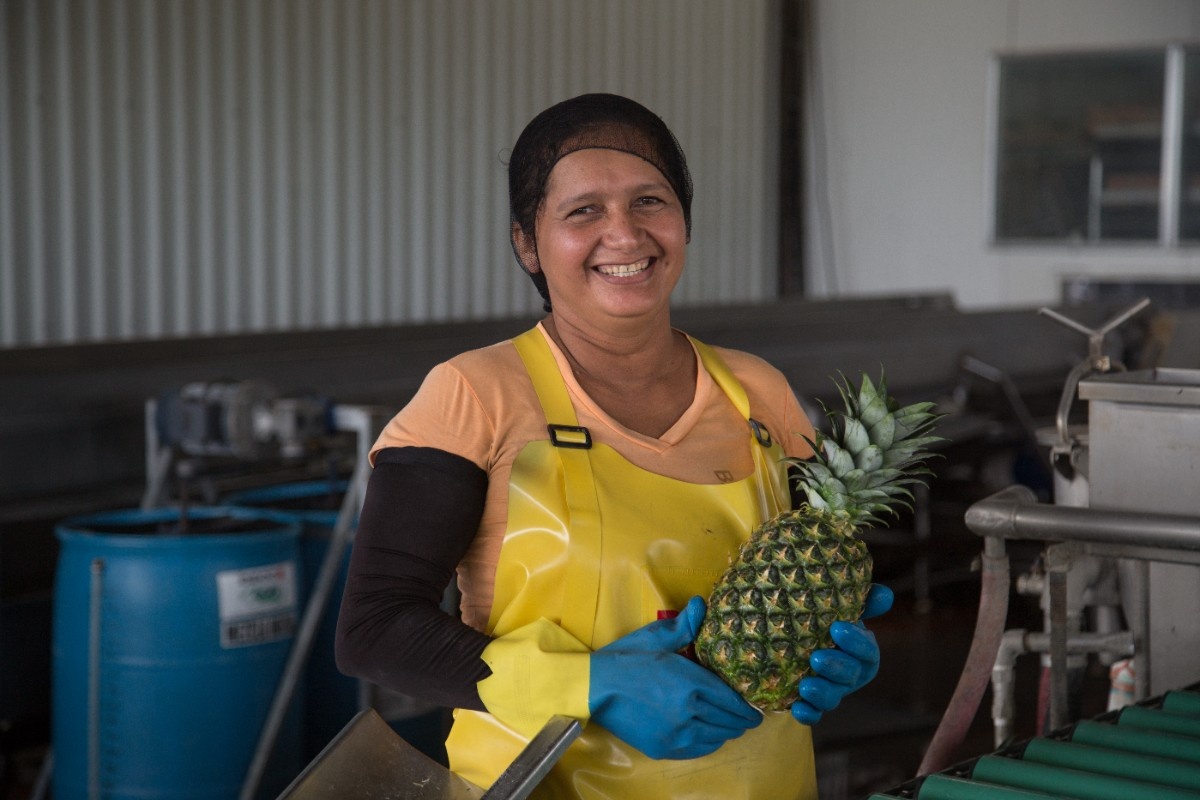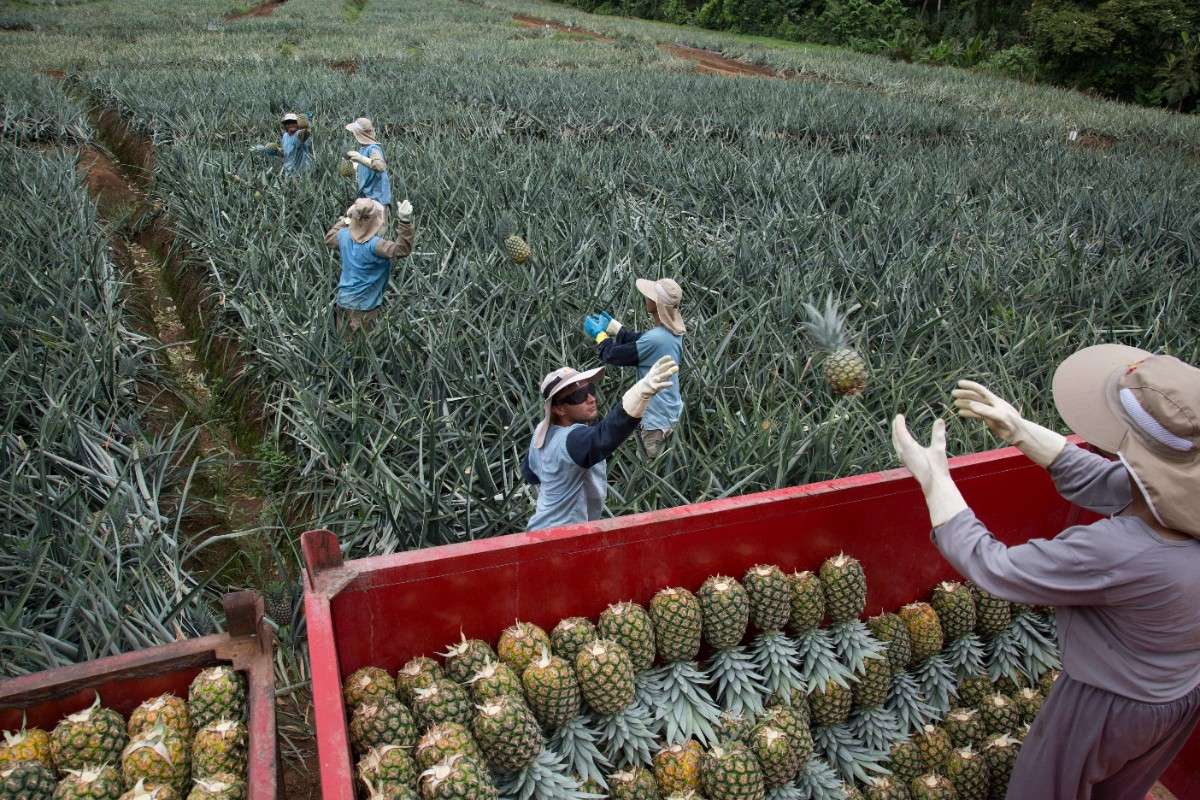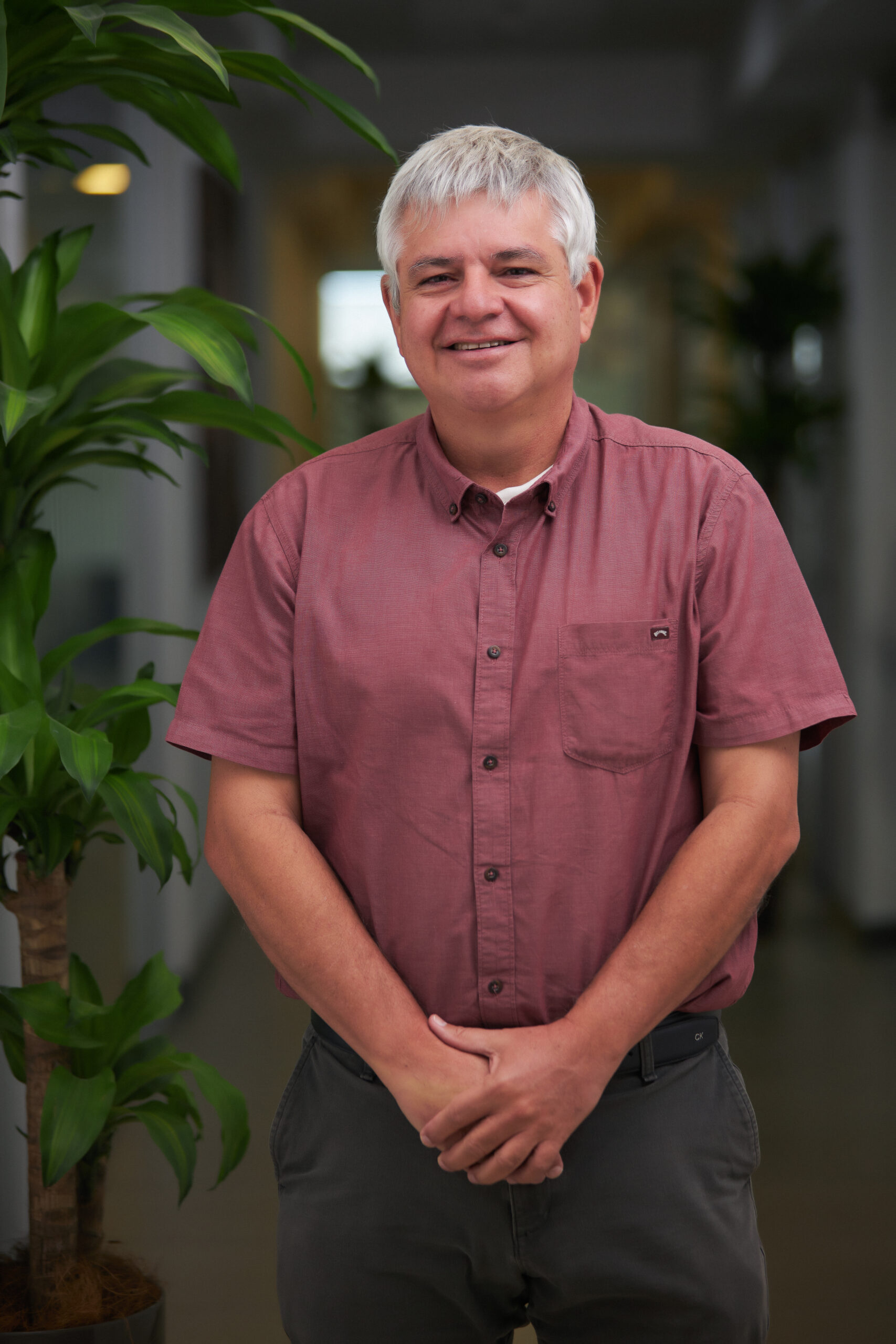
Pictured: Yeris Hernandez, a worker at a certified pineapple plantation in Costa Rica shares: “I think the Fair Trade program is great. My son is now certified in a computer course. Please buy more!”
As we celebrate Fair Trade Month, we’re proud to highlight leaders in our community who invest in creating lasting impact for worker communities. As one of the world’s largest fresh fruit companies, Dole has long recognized that true leadership means creating value for everyone across the supply chain: growers, workers, exporters, transporters, retailers, and consumers. That value spans the social, environmental, and economic legs of sustainability, and it is grounded in “The Dole Way: For People, For Nature, and For Food, inspired by our purpose of Sustainable Food for a Sustainable World.”
Their partnership and commitment to Fair Trade Certified™ is directly strengthening communities and empowering workers across their supply chains. We sat down with Rudy Amador, Vice President of Corporate Responsibility, Sustainability and Communication at Dole Tropical Products Latin America, to see firsthand what Fair Trade leadership looks like:
1. Why did Dole choose to pursue Fair Trade Certification?
There are many reasons that Dole decided to partner with Fair Trade USA™, with three key highlights: First, the Fair Trade standard reflects our commitment to social responsibility and contributing to community development for workers within our supply chains. Second, it allows us to offer consumers a distinct product with more choices in the fresh fruit market. And third, we’ve seen strong demand in the U.S. from retailers and the global Fair Trade community.
2. How has certification evolved over time?
Traditionally, Dole’s Fair Trade partnership was centered around working closely with small grower associations and cooperatives to source organic bananas. Beginning in 2012, we worked with Fair Trade to implement operational standards to benefit the workforce at our pineapple farms in Costa Rica. This effort helped to establish three Fair Trade Worker Committees which now manage and lead the usage of Community Development Funds.
These committees have developed unique ways to use the funds derived from the Fair Trade Premiums, like compounding earnings for several years to build community centers that serve workers and their families. Today, the centers provide education, sports, and health services to workers, their families, and the communities surrounding our farms. They have also helped establish valuable partnerships with government service institutions (technology and health, for example), public education organizations (National Training Institute), and private institutions for health and education.

Pictured: Employees pass recently-harvested pineapples from the field to a pull-cart
3. Do you have any favorite stories of how workers are using Community Development Funds to make change in their communities?
There are many, many examples. One of my favorites is the senior citizen handicraft courses at La Virgen farm, which have become a social event for the towns close to the community center. Retired people tend to have little interaction in rural communities, and these courses have filled a much-needed gap for social bonding and well-being. The positive impact on the quality of life for seniors in these communities can be clearly felt.
Communities have also used funds to implement small business training that helps workers create income-generating enterprises (like salons, shops, and handicrafts); new sporting facilities that host youth tournaments to build health, teamwork, and belonging; and biannual health fairs that bring medical specialists to farms, providing life-changing care and even life-saving early cancer detection.
4. What does leadership mean to you?
Our sustainability journey has taken many decades of dedication and hard work, and today we are proud to stand as leaders in organic and Fair Trade Certified bananas and pineapples. This leadership has been vital, creating meaningful benefits for workers and the communities where we operate. Yet these efforts would be isolated and short-lived without the alliances and partnerships that connect the supply chain from source to market. Worker associations, company farms, government institutions, local communities, the Fair Trade movement, and retailers all work hand-in-hand to bring these initiatives into realization.
5. What does it take to stand out as a leader in a global marketplace?
Though we have been doing it a long time, it’s not easy to differentiate ourselves as a leader within the crowded produce industry, and it can be tough for consumers to cut through the noise and find value-aligned brands. But the Fair Trade Certification definitely helps us stand out. Our certified products are an important alternative for cause-minded consumers who want to make their purchase matter in terms of social progress and respect for the environment.

Pictured: Rudy Amador, Vice President of Corporate Responsibility, Sustainability and Communication at Dole Tropical Products Latin America
6. Can you share some examples of leaders within Dole that have been essential to your Fair Trade journey?
The right answer to this question is our nearly 20,000 employees in Latin America who produce and ship sustainably produced food to dozens of countries worldwide. We also have dozens of dedicated people and managers who make our Fair Trade program so successful. To name a few:
- Peter Gilmore, who established our environmental program and management systems back in the 1990s, which are the backbone of all our successful certifications including Fair Trade.
- Henry Hernandez, who has worked, and continues to work, successfully to support the Fair Trade worker organizations at our pineapple farms in Costa Rica.
- Manuel Rojas, who established in Latin America the best educational program for farm workers in the fresh fruit industry.
- Brennon Neff and our sales team in the United States, who worked along with Fair Trade Certified to establish a market for Fair Trade products with important retailers.
7. What’s the #1 thing that impact-driven brands should think about when looking to create more sustainable supply chains?
Listen to your stakeholders, including workers, employees, retailers, and consumers. Then, base your actions and sustainability priorities on the expectations they have for how your product is produced, who helps produce your product, and who finally consumes it, in order to Help Make the World a Healthier Place.
Discover more stories of leadership and impact from across the Fair Trade community.
Get Involved in the Fair Trade Movement!
Join our dedicated community of conscious consumers, and stay informed on the latest news and updates, learn about your impact, upcoming events, and more!